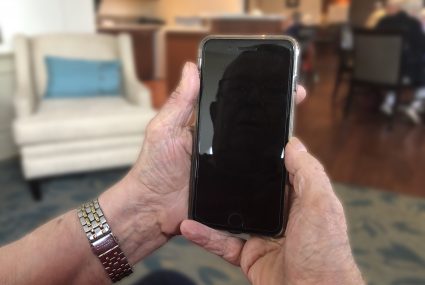Smart devices can make everyday activities much easier for seniors. They can provide peace-of-mind for loved ones, as they make it easy for family members to stay in touch with seniors and monitor their wellbeing when they can’t be there in person. The good news is, you don’t have to be tech savvy in order to use smart devices! They are incredibly intuitive and user friendly, which makes them ideal for people of all ages.
Digital Devices for Tech-Focused Seniors
There are several different types of smart home devices which can make aging in place a safe and convenient option for seniors.
Voice-enabled assistant:
Voice-enabled assistants include devices such as Google Home and Amazon Alexa. This technology is incredibly easy to use and become comfortable with, which makes it ideal for seniors. All you have to do is talk! You can connect these devices to smart home products that allow you to operate them through voice commands. For example you can easily play music, make phone calls, set alarms and reminders, ask questions, search without using your computer, and more, just by speaking out loud to the device.
What’s extra great about these devices is that they can also provide seniors who live alone with more interaction throughout the day. Many seniors enjoy speaking to their devices, and they can become almost like a companion.
Smart Home Devices
Many smart home products can be connected to voice-enabled assistants to allow you to control them with spoken commands or by smartphone or tablet apps. Smart light bulbs allow you to easily control the lights in your home. They can be set to automatic timers and can be controlled through voice command or smartphone apps.
Smart heating systems like Nest are also a great option for seniors. They make it easy to control and program thermostat settings, so they can keep the temperature comfortable.
Smart Sensors
Smart sensors can be set up as a way to monitor and track a loved one’s movements and behaviour in a way that’s much less intrusive than security cameras. Sensors can be set up throughout the home to have your home respond to your movements. For example, a motion sensor could automatically turn on the lights when you enter a room. A bed sensor can send an alert to an offsite caregiver to let them know their loved one is up and moving around.
A bed sensor could also trigger an automation in which the doors are locked, lights are turned off, and other tasks completed once someone climbs into bed, which can add another level of safety and security for seniors who live on their own.
Sensors can be tricky to set up on their own, so it’s often best to get a professional to come in and set it up for you.
Smart Security Systems
Smart security systems make it easy for caregivers to ensure their loved ones are safe at home. A smart security system, such as Abode, can be set up to monitor doors and windows, lock and unlock doors, and sense motion. It can be accessed by caregivers to monitor the home when they can’t be there in person. It can also be set up to a voice-enabled assistant to allow seniors to easily control the system through voice commands.
Some smart security systems can also be connected to things like smoke alarms and flood sensors to alert caregivers when these alarms are triggered, so they can check in on their loved ones.
There are also security-focused devices such as video doorbells, which allow users to see and interact with visitors without actually opening the door, and stovetop shut-off devices like the IGuardStove, which uses motion sensors to automatically turn off the stove or oven after a period of inactivity and can send text alerts to caregivers if activated.
Medication Management
It can be a challenge for some seniors to keep track of which medications they are supposed to take and when they are supposed to take them. Smart medication dispensers can make this easier by following pre-programmed schedules set up by caregivers. This ensures seniors will always have the right dosage at the right time. If a particular medication is missed, it can also send an alert to caregivers so they can check in and find out what’s going on.
There are also many reminder apps that can be set up on a smartphone or tablet to send reminder prompts to take medications throughout the day.
With devices like these in place, seniors can feel confident and safe being at home on their own. They also provide loved ones with peace-of-mind, knowing that they’re safe and able to get assistance when they need it. If you think a smart home device might be a good fit for your loved one, have a discussion with them and gauge their comfort level. A voice-enabled assistant is a great place to start, as it’s incredibly easy to use and set up, and can get them comfortable with the idea of adding more smart home devices.

Comments